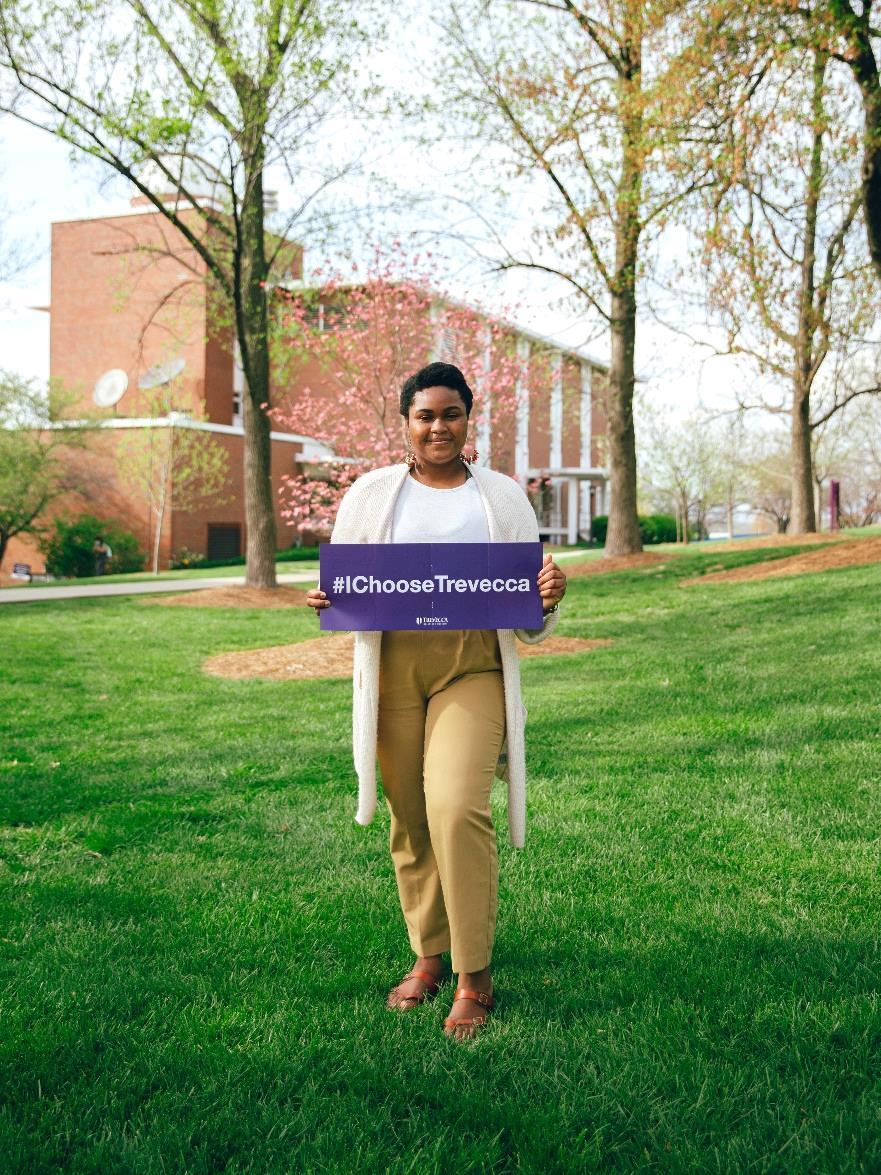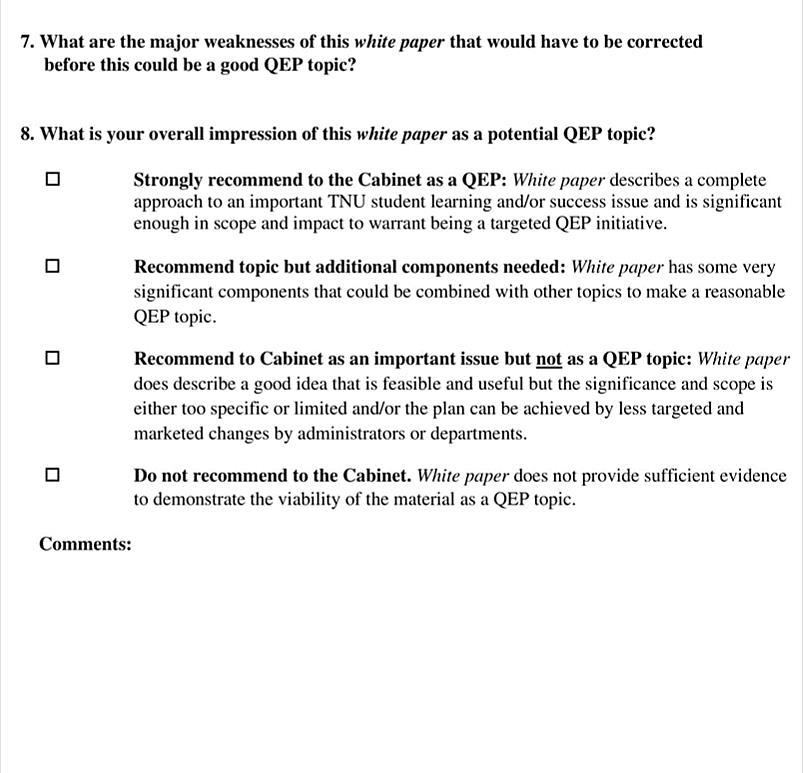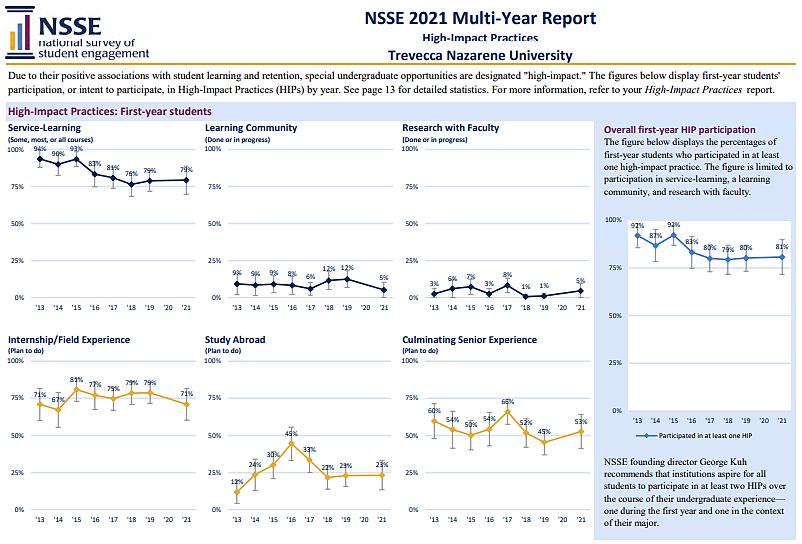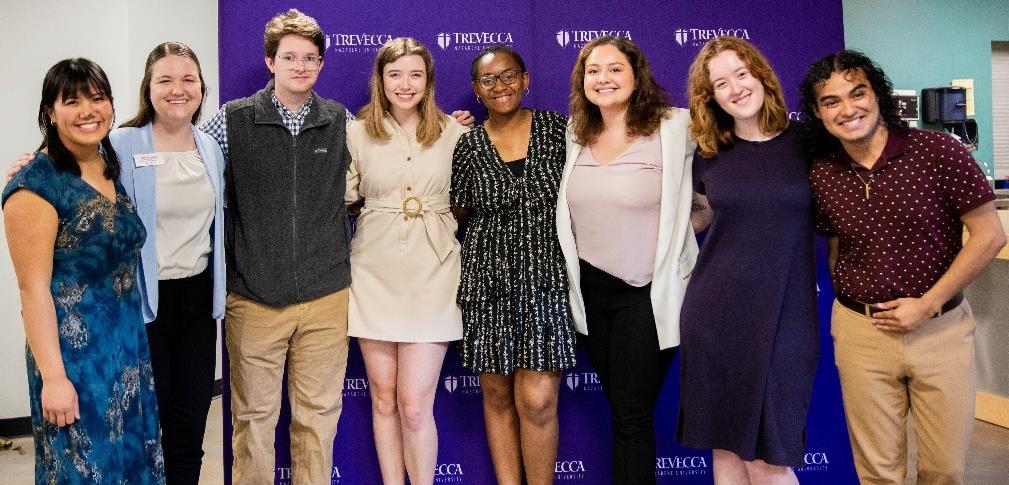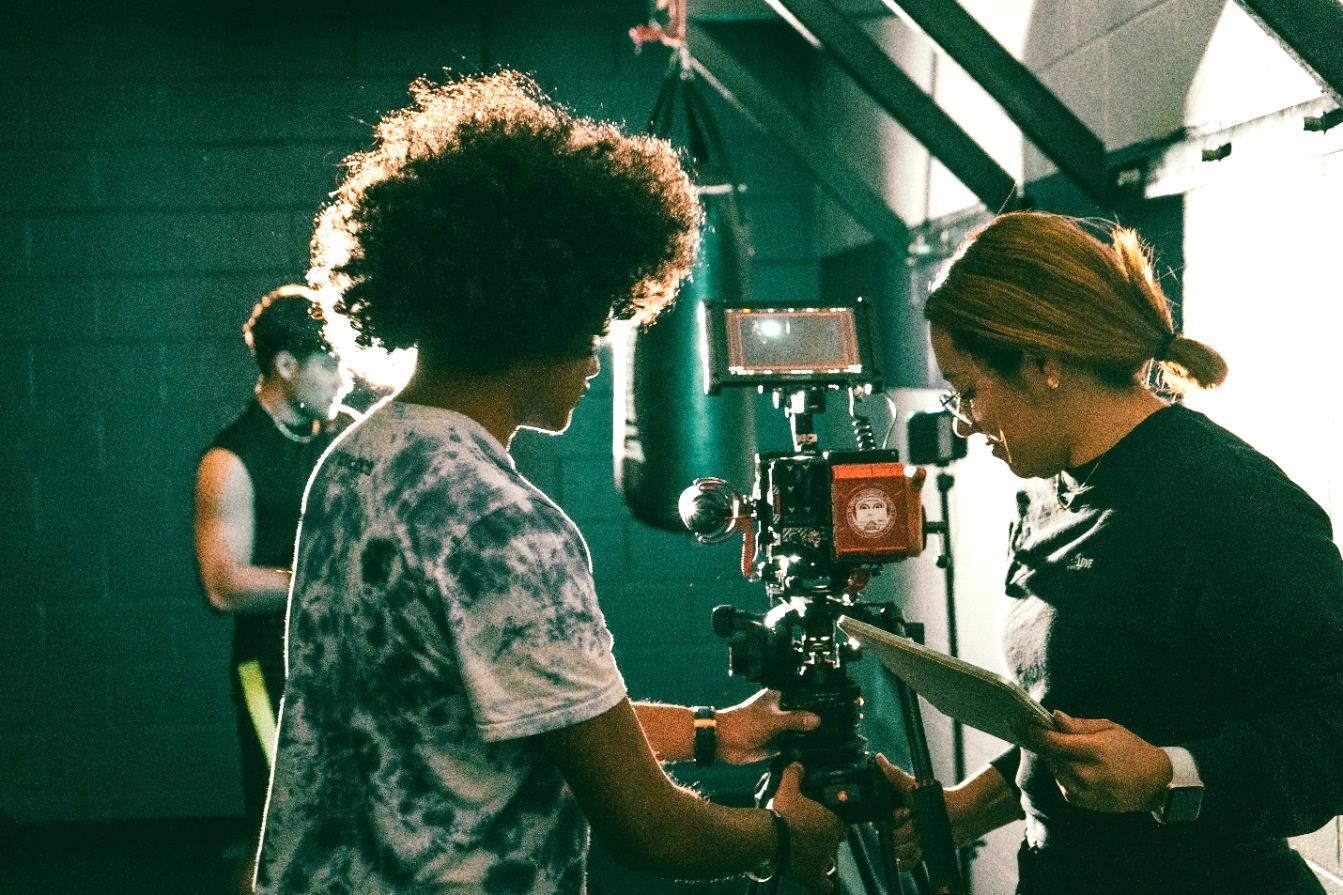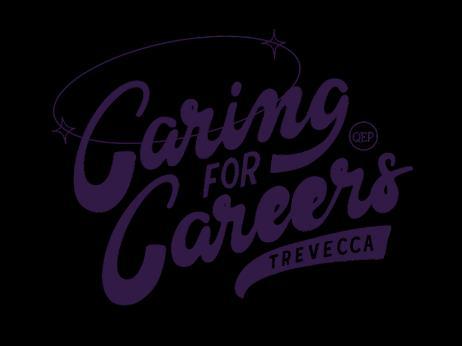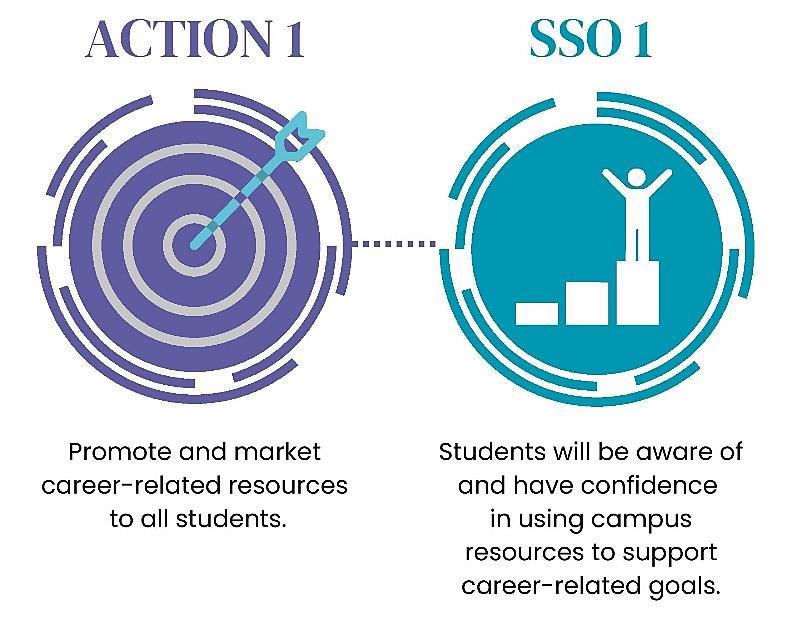
18 minute read
Table 10 - QEP Action Plan
Action Responsibility
1. Promote and market career-related resources and events to all students.
2. Expand and relocate the Office of Career Development and Connection to a student-facing location.
3. Increase personnel in the Office of Career Development and Connections.
4. Identify and define experiential learning at Trevecca along with determining preferred tracking software.
5. Expand and improve the experiential learning opportunities among programs
QEP Director, Office of Career Development and Connections, Marketing Department, Student Representatives
QEP Director, Office of Career Development and Connections, Finance Department, University Cabinet, Student Representatives
QEP Director, Office of Career Development and Connections, Office of University Engagement, Finance Department, Student Representatives
QEP Director, Department Chairs, QEP Experiential Learning Sub-committee, Deans, Directors, Department Chairs, Program Directors, Faculty, Student Representatives
QEP Director, Industry Partners, Department Chairs, Program Directors, Faculty, Staff, Experiential Learning Sub-committee, Office of Career Development and Connections, Office of Student Development, Student Representatives
6. Provide students access to seminars and workshops featuring alumni and professional mentors who can address various topics related to career success.
7. Mapping of NACE competencies to academic coursework and learning outcomes.
8. Create a Faculty Champion program to assist faculty with career competency integration, faculty-led mentoring experiences, and experiential learning opportunities.
9. Create a resource library for both faculty and students.
QEP Director, TNU Talks Committee, Deans, Department Chairs, Program Directors, Office of Alumni Engagement, Faculty, Staff, Industry Partners, Office of Career Development and Connections, Student Representatives
QEP Director, QEP Curriculum Sub-committee, Faculty, Deans, Department Chairs, Program Directors, Office of Institutional Effectiveness, Student Representatives
QEP Director, Faculty, Deans, Department Chairs, Program Directors, Faculty Champion Sub-committee, Student Representatives
QEP Director, Faculty, Deans, Department Chairs, Program Directors, Office of Career Development and Connections, University Marketing, University Library Personnel, Student Representatives
10. Develop new curricula to engage traditional sophomores, juniors, seniors, and adult undergraduates in coaching and mentoring opportunities through Faculty-Led Academic Mentoring Experiences (FLAME)
QEP Director, QEP Curriculum Sub-committee, Faculty, Deans, Department Chairs, Program Directors, Student Representatives, Student Representatives
The ten actions of the QEP are designed with all students in mind (traditional, adult, and graduate). While this is an ambitious QEP, the greatest need is to impact all students in the career development process.
Several actions in the plan represent new strategies and initiatives that will be implemented over the duration of the five years. New strategies include NACE competency curriculum mapping and integration, resource libraries for faculty and students, faculty facilitators program, and the development of new curricula for coaching and mentoring opportunities. Other actions include the enhancement and improvement of existing strategies. Those include increased and targeted promotion and marketing of career-related resources through the Office of Career Development and Connections, defining, identifying, and expanding experiential learning opportunities, and the relocation and increased staff in the Office of Career Development and Connections.
The QEP director will primarily be responsible for implementing the action plan. To do this, the QEP director will convene a Curriculum Committee, Assessment Committee, Faculty Champions Committee, and an Experiential Learning Committee, along with several other stakeholders such as the Office of Career Development staff, faculty, and departments. These committees will include broad representation from faculty, staff, and students. The QEP organizational structure and details regarding responsibilities are discussed in Chapter 6. The action plan is achieved over several years, and a detailed timeline is presented in Chapter 5. The remainder of this chapter provides a detailed description of the action items to be implemented.
ACTION 1 - Promote and Market Career-Related Resources and Events to All Students
The QEP director with the Office of Career Development and Connections will partner with the University Marketing Team to create, develop, and implement a comprehensive communication plan to build awareness and promote career-related resources. This includes but is not limited to the creation and implementation of strategies for expanding and enhancing of the Career Development webpages within the Trevecca.edu website that will be comprehensive of all services and resources offered by the Office of Career Development and Connection and University at large that are career related Features that will be included on the webpages will be mission and vision statements; descriptions of and links to online careerrelated resources available to all students provided by the University (such as Handshake and SkillsFirst); links to the audio-visual repository of professional speakers and workshops; additional links to external and helpful career-related resources; and instructions and links to make appointments with staff in the Office of Career Development and Connections. This will begin in the first year, fall of 2023.
These same steps will also be repeated for the Trevecca Career Development and Connections SharePoint site, which exists as a resource only for internal usage of faculty, staff, administration, and students.
ACTION 2 - Expand and Relocate the Office of Career Development and Connection to a Student Facing Location

The QEP director, the Office of Career Development and Connections, The University Cabinet, and Finance Team will develop a plan for the relocation of the Office of Career Development and Connections to a more student-centered and populated space on campus while remaining part of the Office of University Engagement The development of the relocation plan will begin in the fall all 2024, with the relocation in the third year.
The goal of the relocation is to increase the visibility and accessibility of the Office of Career Development and Connections for students who attend classes on-campus. This center will serve as a hub and provide a place for students to obtain career coaching, engage with employers and recruiters, access career-related resources, and connect with peers. The newly relocated center will expand to include the addition of two personnel.
ACTION 3 - Increase Personnel in the Office of Career Development and Connections
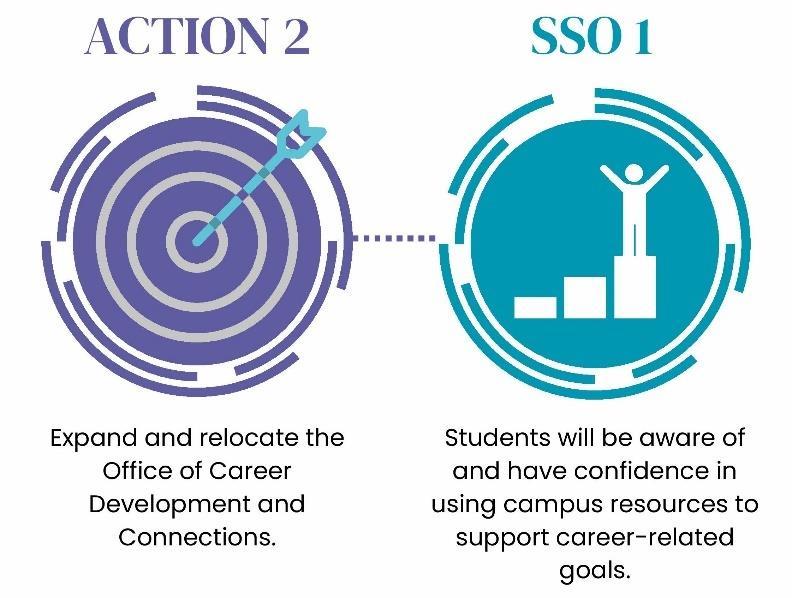
During the second year, the University will begin the planning phase for two additional full-time employees for hiring in the third year A short description of each job can be found in the addendum (Appendix E).
These two additional staff members will work toward fulfilling several of the action items in the QEP while also serving as employees within the Office of Career Development and Connections. For example, one staff member will be responsible for the creation and maintenance of the Faculty Champions Program, working with the QEP Curriculum Sub-committee to integrate and map NACE competencies into the curriculum and assist in the creation and maintenance of the resource libraries while also serving as a Career Coach for traditional, adult, and graduate students.
ACTION 4 - Identify and Define Experiential Learning at Trevecca
One central motivation of the overall QEP is improving experiential learning at Trevecca by designing and supporting exceptional experiential learning opportunities across the degree programs and disciplines. Over the coming 2-5 years, the student experience should therefore reflect new opportunities through expansion and improvement of student experiential learning offerings, as appropriate, across all disciplines and degree programs. Such a goal will require ongoing discussion and exploration among faculty and staff of experiential learning opportunities associated with different academic programs. Such discussion will encourage leadership to design, adopt, or improve experiential learning strategies/applications.
The University will undergo a discovery process in the first year to identify and define experiential learning at Trevecca. Trevecca program leaders, department chairs, and deans will be asked to respond to a survey about their working definition of experiential learning, how it is expressed in their program, and its importance to the overall Trevecca experience. Consideration will be given during the first year to identify a pilot group of two or three departments that could be used as a test group for both platforms before deciding which platform to use campus-wide in the second
Year
During the fall of the second year of the QEP implementation, school deans, department chairs, and program directors will determine best practices for tracking experiential learning. Trevecca has access to two different platforms that could serve to track these experiential learning opportunities with no additional associated costs– Handshake and Presence. After identifying the tracking system to be used, all current experiential learning opportunities will be added to the software to prepare for access and usage by students and faculty in the third year.
ACTION 5 - Expand Experiential Learning Opportunities Among Programs
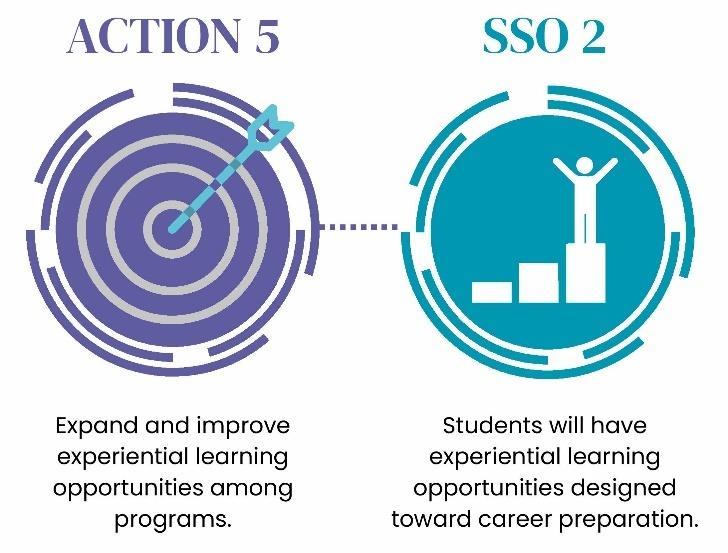
After determining the best data-tracking platform and reviewing collected data from the pilot groups, Trevecca will increase the number of experiential opportunities across programs and disciplines. Faculty Champions or other identified faculty will work closely with programs and disciplines new to offering experiential learning in their curricula. Increasing opportunities for experiential learning aligns with the third essential element that defines Trevecca's character, "helping the individual student. " Increasing opportunities for experiential learning assists all students in enhancing their skill sets and prepares them for careers in today's workforce. These opportunities will be increased in two ways: (1) increase the creation of internships, research, service learning, or other experiential learning/work-based learning opportunities; (2) for those students who cannot participate in internships or experiential learning, alumni will be asked to serve as mentors or undergraduate students can participate in Faculty-Led Academic Mentoring Experiences (FLAME) courses.
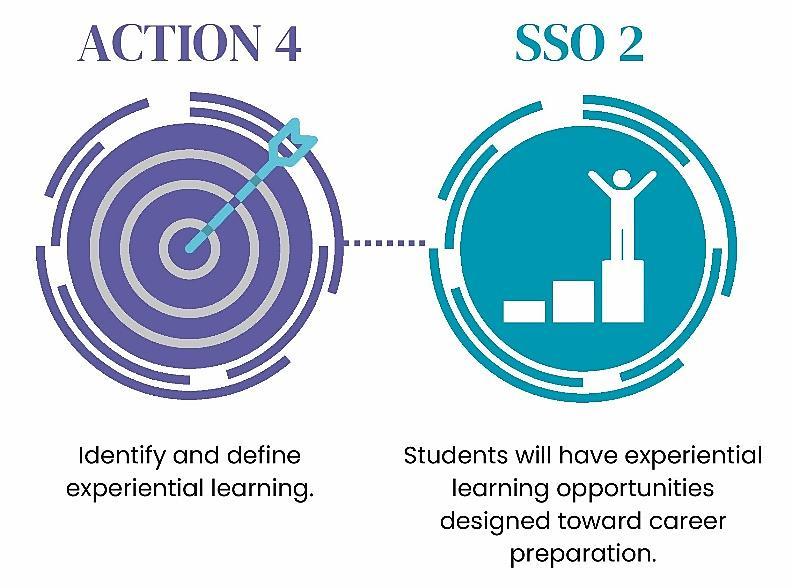
Mini-grants will be available to faculty to support the increase of experiential learning in their academic departments. This includes but is not limited to resources and materials, overload pay, communication and promotion, recruitment, and relationship building with employers. The Experiential Learning Subcommittee will develop the guidelines and application process in the first year
ACTION 6 - Provide Students Access to Seminars and Workshops Featuring Alumni and Professional Mentors Who Can Address
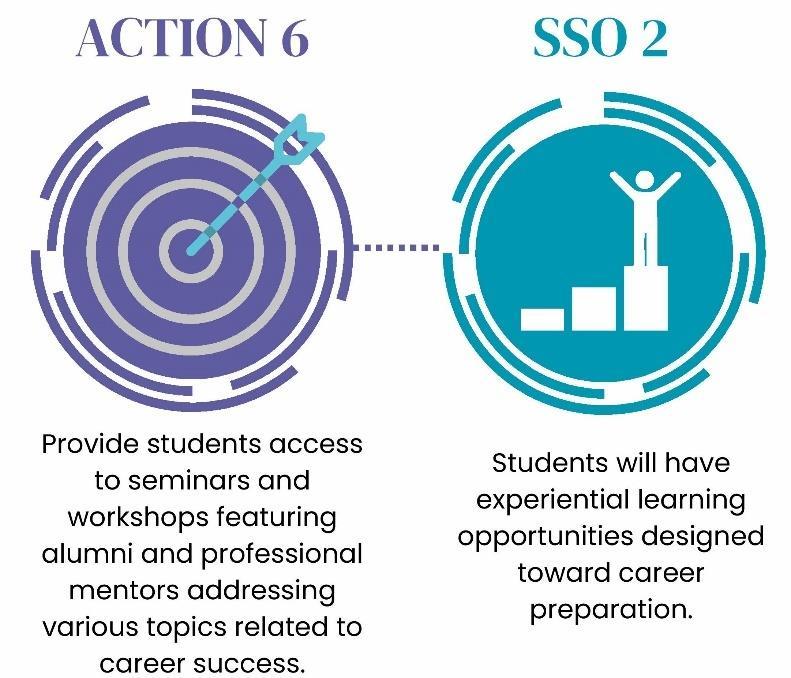
All students will have access to seminars and workshops featuring alumni and professional mentors that can address various topics related to career success. This effort will take place through two initiatives: 1) the creation of an audio/video repository for the collection and distribution of recordings of seminars and workshops taking place at the course, program, department, school, and university level, and 2) an annual event patterned after the popular TED Talks lecture series.
Audio/Video Repository
In the first year, a campus-wide effort will be initiated to identify and record speakers, panelists, lecturers, and workshop events that already occur randomly on campus and store them in an audio and video repository all in one easily accessible location that will be readily available to all students. This effort will require new policies, procedures, and infrastructure for editing, uploading, and storing content.
Guest speakers, lecturers, and panelists will be required to sign audio/video release forms that grant permission to the University to record and publish recordings of the event in which they are participating. Trevecca’s audio/video department will need to be equipped and trained to facilitate higher-quality audio and video recordings for special events. Professional audio or video recordings will be required for these career-related events.
The audio-visual repository and its relation to career readiness will be introduced and explained to all faculty, staff, and administrators, including the need for the repository and training on the process of requesting recording assistance and submit recorded content. The focus and intent of this repository are to create a culture of sharing where everyone involved in career-related special events begins to think of how to share their event with all students. All students will have access to the site. Videos will be private and accessible only to the campus community. Students will access the site on a separate student-facing page.
In the second year, the A/V Repository will be launched to students and faculty as an additional careerrelated resource, including adding of links to the repository onto webpages and communicating promotions to students and faculty.
TNU Talks
Modeled on the popular TED Talks format, TNU Talks will be an annual event featuring a variety of alumni and professional mentors addressing various topics related to work and careers within various disciplines. This event will be accessible to all students through face-to-face attendance, live video streaming, or audio and video recordings.
Each year a different school within the University will be tasked with sponsoring that year’s TNU Talks event. The sponsoring school will be responsible for developing a theme for the year, working with the other schools to coordinate speakers, planning, and executing the event, and collecting and submitting recordings for inclusion in the audio/video repository. The overall theme will be related to career success or mentoring. In addition, each year, at least one speaker needs to address how students can find mentors and coaches to help them with their careers. A TNU Talks committee will be created, including representatives from marketing, technology, University engagement, and a representative from each school that will help guide and support the sponsoring school throughout the process and provide brand consistency as the event passes from school to school.
The event will begin in the second year on campus during the spring semester of each academic year. It will be promoted across all programs and levels of degrees as well as to the entire TNU community, including faculty, staff, administration, and alumni. This will be a free event and will be live-streamed and recorded for both audio and video distribution through the audio/video repository.
ACTION 7 - Mapping of NACE Competencies to Program Coursework and Learning Outcomes
A multi-faceted approach will be implemented with a focus on integrating the NACE competencies (Appendix F) into the curriculum over a several-year process. In the first year, faculty will receive training regarding NACE competencies and instruction for mapping and teaching these into core classes in all programs. For students to recognize they have learned the NACE competencies, faculty will need instruction on how to teach them in their classes. The QEP Curriculum Committee will provide training during the first year to assist in this process. Also, during the first year, programs will create a baseline for success in teaching and assessing the competencies in core classes. Because this is the first time the University will have been exposed to this process, there is no current baseline for assessment.
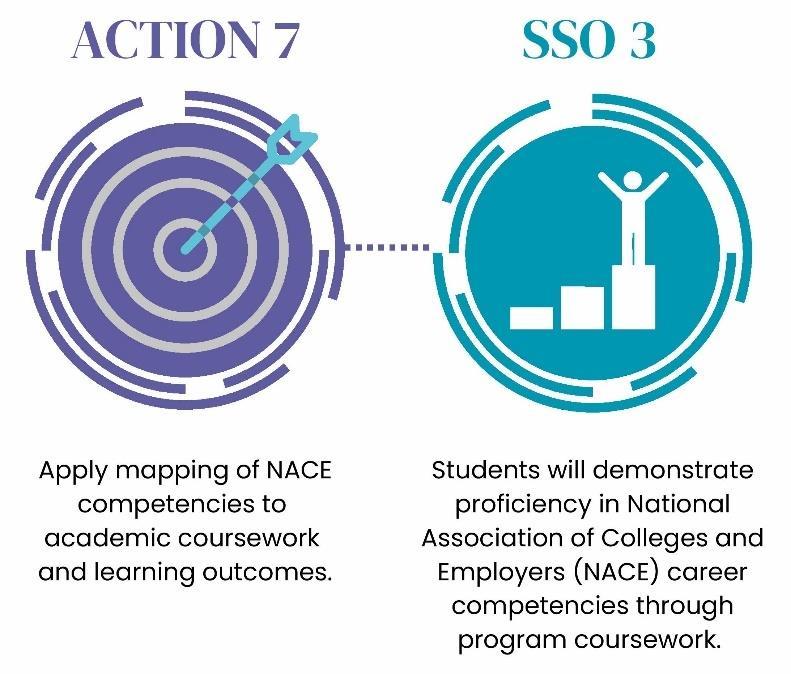
Training sessions for faculty will include the introduction of the NACE competencies, as well as the mapping templates and process for integration. These sessions will provide faculty with time to ask questions about the integration process and to begin thinking about how they are already incorporating these competencies in various courses and specific assignments. These sessions could either be held during department meetings throughout the fall or even take place in several smaller sessions in the pre-semester period of faculty professional development. All faculty should plan to attend. Virtual sessions or video recordings will be available for remote faculty. The faculty, the QEP director, and the QEP curriculum subcommittee will continue discussions and advisement as academic programs begin the process of mapping throughout the remainder of the first year. These sessions will also provide examples of ways the faculty could edit their program student-learning outcomes to address competencies not already included or to create new outcomes as needed by the programs.
After being trained on the process in the first year, each program will complete two NACE competency maps using the following templates that examine the core classes in each program in relation to the NACE competencies as well as the individual program student-learning outcomes in relation to the NACE competencies. While some programs may have this process completed during the first year, this will be completed by the end of the first semester (fall) in the second year. The completed mapping templates will be updated and submitted annually to the Office of Institutional Effectiveness. This process will repeat yearly until all eight NACE competencies have been mapped and integrated into coursework.
Each year, beginning in the second year, programs will be asked to identify which assignments and courses align with NACE competencies over the five-year integration period. Data will be collected on the University Academic Assessment Planning Document which the Office of Institutional Effectiveness collects. The QEP curriculum sub-committee will determine which NACE competencies will be integrated each year. In utilizing a direct measure of NACE competencies in the classroom, the institution can show whether it improves student success related to career development and the associated competencies.
ACTION 8 - Create a Faculty Champions Program to Assist Faculty with Career Competency Integration, Faculty-Led Academic Mentoring Experiences and Experiential Learning Opportunities
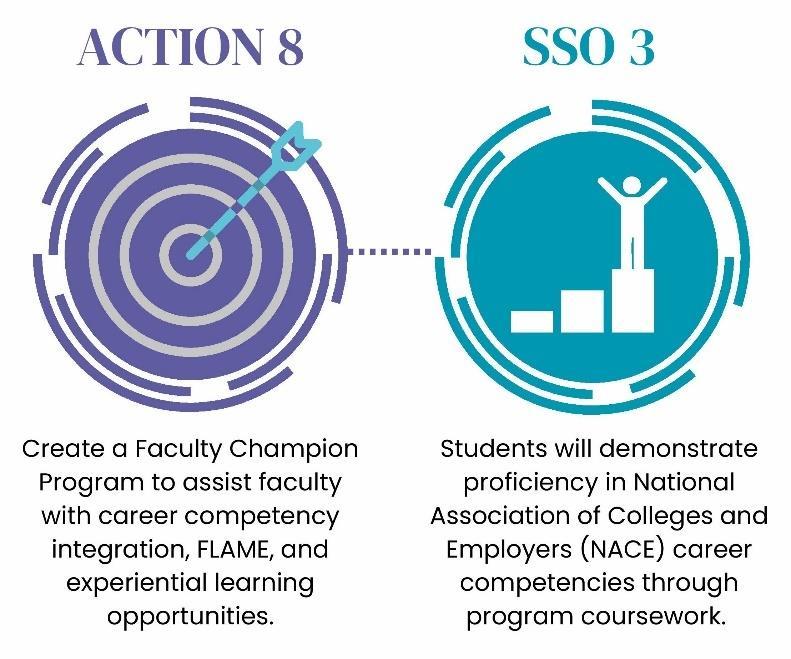
The Faculty Champions program will be created to support faculty in the career development and integration process by identifying individuals who will serve as career champions in their departments and programs. This program will give faculty the necessary tools and knowledge to make the connection from the classroom to careers easier by championing the relationship between classroom knowledge and careers.
Tier One to Be Developed in Year Two, Starting Cohorts in Year Three
The goal of Tier One is to launch the Faculty Champions program by selecting one faculty member from each school. These faculty will effectively work independently within their academic departments but will be loosely organized as a team of Faculty Champions to share ideas and successes. These Champions will serve as leaders to organize internal faculty teams exploring viable options to integrate career development within academic, research, internship, clinical, teaching, or other experiential learning opportunities focused on developing student career skills and insights. Each champion associated with that educational program will partner with faculty to provide examples of career-development initiatives that can be integrated (with low effort) into existing educational settings and encourage discussion among program faculty about the importance of careerdevelopment initiatives within that program.
Some examples that champions would likely be involved with include:
• Serve as a mentor to individual faculty or a small team of faculty to help build common skill sets within a specific program(s) related to the QEP.
• Organize/lead presentations on campus on topics (as individuals or in collaboration with other facilitators) related to faculty contributions to student career-readiness.
• Collaborate with fellow champions to identify new career-development initiatives.
• Partner with the Office of Career Development and Connections to explore opportunities at the intersection of academic efforts toward career development and formal employment (summer internship or permanent) opportunities.
• Demonstrate a deep interest in experiential learning, generating new ideas, and providing strong leadership to assess and increase student experiential learning opportunities. They would collaborate with deans and department chairs to track experiential learning data and determine best practices.
• Understand and explore NACE competencies with their fellow faculty.
• Celebrate Trevecca’s academic efforts in career development (NACE competencies) through annual (or biennial) contributions to a regional or national conference or participation (or as a lead/co-lead) in a regional professional career development meeting/workshop.
• Promote FLAME (Faculty-Led Academic Mentoring Experiences) courses.
• Develop evaluation tools to measure accomplishments of Student Success Outcomes focused on one of three groups: 1.) those who are currently pursuing coursework, 2.) those who are approaching graduation from a degree program, and 3.) those who are 2-5 years post-graduation.
Interested faculty would apply in the late fall semester to be accepted into the next academic year’s cohort of Faculty Champions. The application process would require a current CV and a one-to-two-page statement of interest, including what they might want to highlight during their time as a Faculty Champion. A small committee would evaluate applications and make recommendations by the end of January. This process will be promoted in the fall during the second year to solicit applications for a cohort starting in the third year The intention is to have a minimum of six faculty (one per school) but more in each cohort would be encouraged.
Tier Two Plans to Be Developed in Year Three, with a Goal of Fully Launching in Year Four
Beginning in the second year, a professional staff member housed within the Office of Career Development and Connections will oversee the Faculty Champions Program to ensure the program ’ s establishment and longevity.
Tier Two would include (but not be limited to as programming evolves):
• Support of Faculty Champions of associated faculty teams experimenting with new approaches/methods/strategies in experiential learning resources and practicums;
• Support the sharing of experiential learning/career preparation experiences within the university;
• Encourage and support faculty/student contributions to external conferences;
• Organizing workshops/gatherings with the purpose of sharing career-focused experiences internally;
• Support Faculty Champions to guide/encourage others to start new conversations on career readiness opportunities in education;
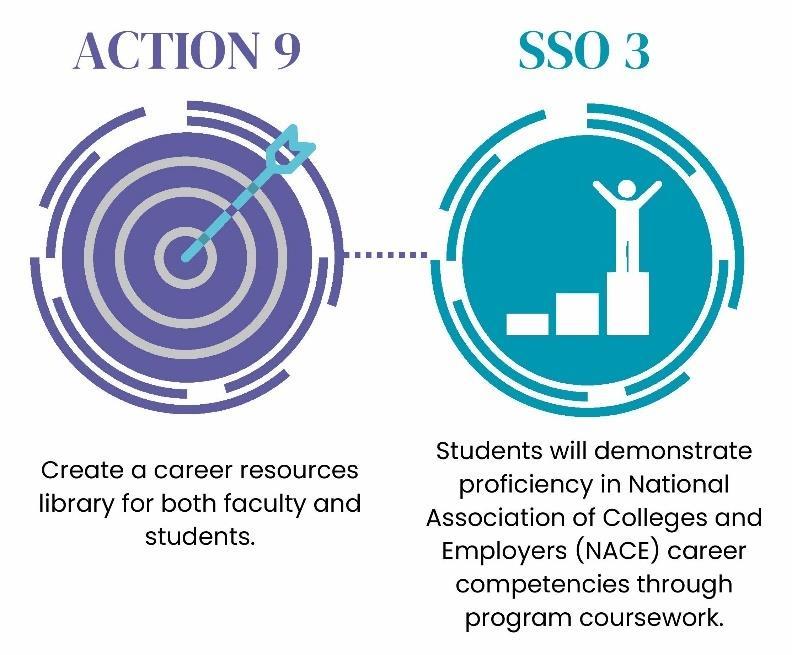
• Contribute to (but not author unless they wish to) resource/prototype/evaluation website at TNU;
• Seek champions from multiple disciplinary areas to encourage diversity in discussion/contributions (e.g., music, humanities, business, health sciences, natural sciences); and,
• Contribute to ongoing discussions.
ACTION 9 - Create a Resource Library for Both Faculty and Students
Faculty Resource Library
A resource library will be created to support career development and the integration of NACE competencies into the curriculum for faculty to use in their classes and course development. This resource library will be housed internally on the Microsoft SharePoint platform to support easy access. This resource library will contain a variety of resources. A needs assessment will be done in the first year to help guide the library’ s design. Resources will be gathered during the first year and organized by genre (syllabi, assignments, rubrics). They will be tagged as to whether they are geared toward undergraduate, adult, or graduate courses. In the fall of the second year, the faculty resource library will be made available to the campus community.
Student Resource Library
Working with library faculty and staff, as well as career development staff, a student resource guide geared towards career readiness will be created. This resource guide will contain links to various professional organizations and resources that are discipline specific; guides for CV/resume building; cover letter guides; guides for personal, religious, and diversity statements; links to job-finding sites; and bibliographies of books that might be useful to students. In the fall of the second year, the student resource library will be made available to the campus community.
ACTION 10 - Develop New Curricula to Engage Traditional Sophomores, Juniors, Seniors and Adult Undergraduates in Coaching and Mentoring Opportunities Through FLAME Courses
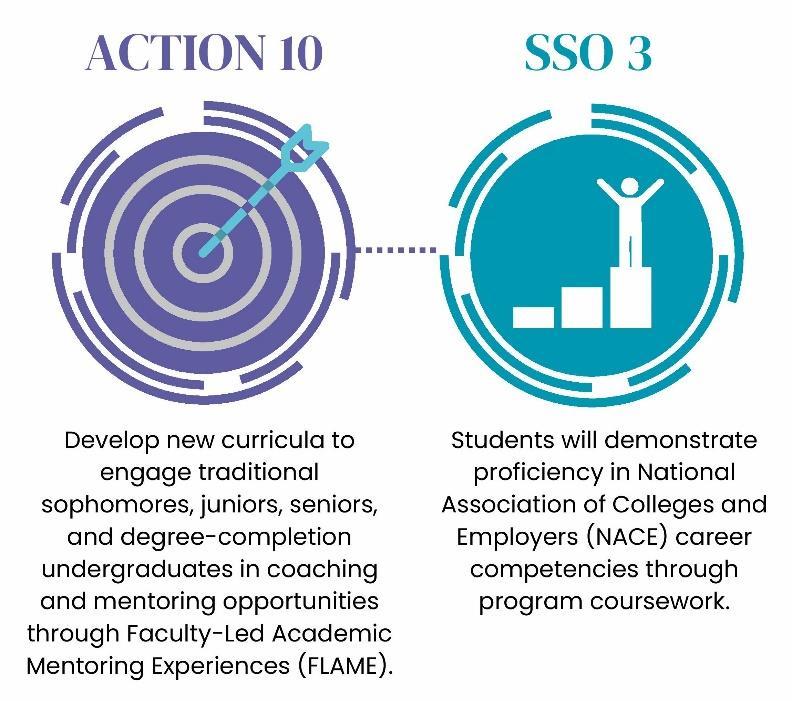
The central idea behind Faculty-Led Academic Mentoring Experiences (FLAME) courses comes from the previous Quality Enhancement Plan on the topic of undergraduate research. During this past QEP, the University created Faculty-Led Academic Research Experiences (FLARE). This FLAME idea will loosely model that prior initiative with the creation of mentoring experiences designed to provide students with additional exposure and opportunities to connect with career-related practitioners within their discipline under the guidance of active practitioners and the sponsoring faculty member. The development of these experiences will begin during the second year, with full implementation beginning in the fourth year.
A FLAME course will be added to the catalog under each subject area (such as BIO xxxx, COM xxxx, MUS xxxx) in the undergraduate curriculum. These courses will be worth 1-3 academic credits and may be extended for up to six hours of total credit, depending on the breadth and depth of the project. An example of a FLAME project would be a small business competition where students are placed on teams along with a mentor/coach to develop a business plan for presentation to a panel of small business owners. The idea determined to be the most viable would then be developed by all participants for implementation in the second semester, again under the guidance of a mentor/coach.
Beginning in the spring of the second year, the provost, QEP director, and Faculty Champions coordinator will announce a competitive call for FLAME course proposals. The courses will take place for the first time in the 2026-2027 academic year. Required proposal elements will include a project abstract, a project narrative, student learning outcomes, an assessment rubric for the project, and a budget. A letter of support from the faculty member’s department chair or program director must accompany each proposal for it to be considered.
Proposed projects will be required to involve undergraduate students in actual hands-on learning under the guidance of a practicing professional in the discipline. Specific student involvement will vary from project to project including experimentation, product development, marketing, presentations, demonstrations, and a variety of other hands-on activities. In most cases, each project should span one academic term (fall, spring, or summer). However, the FLAME committee will consider longer-term projects depending on the depth and budget of the study.
In the fall of the third year, FLAME proposals will be accepted by a FLAME committee comprised of the provost, academic deans, three to five appointed faculty members, the QEP director, and the Faculty Champions program coordinator. The committee will use a rubric to evaluate the FLAME proposals and use this data as one of the primary criteria for making FLAME selections.
Students can then register for FLAME courses in the spring of the third year for the next academic year The number of proposals/approved courses will be determined by the FLAME Committee relative to the budget and the strength of the proposals. The proposal process will continue, with a call for future FLAME proposals issued each spring, selected in the fall, and implemented in the following academic year.
After a FLAME course is approved, faculty members can begin recruiting students for participation in their project. Students must complete a FLAME application before they are approved to participate in the course. Students should be sophomores, juniors, seniors, or adult undergraduate students in order to participate in FLAME courses. The faculty-mentor (faculty member listed as the instructor for the FLAME course) will make final decisions in the selection of student participants. Only selected students will be allowed to enroll in a FLAME course. Each FLAME course should have a minimum of eight students enrolled. If the FLAME course involves human subjects, the faculty-mentor will be responsible for obtaining approval from Trevecca’s Institutional Review Board.
FLAME courses will be figured as part of the faculty member’s regular load; therefore, a three-hour FLAME course would give that faculty member three hours of faculty load. If needed, the University will provide an adjunct to cover that faculty member’s regular teaching course load. If the FLAME course is added in addition to a faculty member’s “regular load,” the faculty member may be eligible for “overload pay.”
The faculty-mentor will coordinate the meeting times with students and prepare them with any specialized knowledge needed before the project begins. FLAME courses may meet during a regularly scheduled course timeslot; however, it is not a requirement as long as the faculty-mentor documents that students are meeting the required hours of academically-engaged time (37.5 hours per unit of academic credit).
The student learning outcomes for each FLAME will be developed and put into a rubric format by the faculty-mentor, according to the goals of his/her project. The submission of this rubric will be part of the FLAME application. The student learning outcomes of the FLAME project should reflect the student success outcomes identified in the QEP, as well as the project’ s specific objectives. After each course, faculty-mentors will complete rubrics assessing each student learning outcome in the FLAME course and submit copies and compiled scores to the Office of Institutional Effectiveness and QEP coordinator for course evaluation and institutional assessment.



